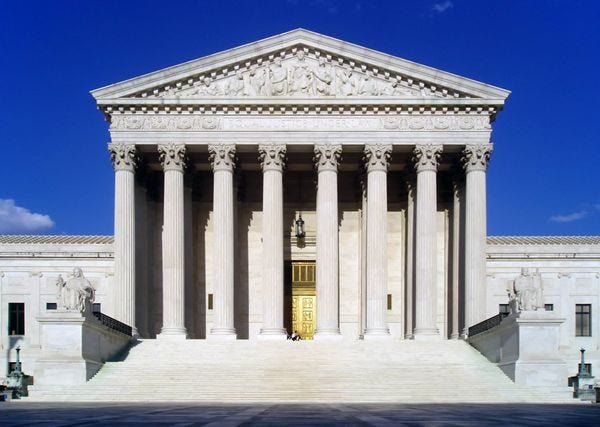Feckless SCOTUS Punts
Unanimously? Are you kidding us with this shit!
No pressure in November, but looks like the Supreme Court is going to do FUCK ALL about gerrymandering this term. In a unanimous decision authored by Chief Justice Roberts, the Court remanded the landmark Gill v. Whitford redistricting case on standing -- in other words, they won't be ruling on it because the plaintiffs challenging the gerrymander hadn't adequately proved that they personally had the right to challenge Wisconsin's preposterous districts.
The Court acknowledged the gerrymander:
In 2012, Republicans won 60 Assembly seats [out of 99] with 48.6% of the two-party statewide vote for Assembly candidates. In 2014, Republicans won 63 Assembly seats with 52% of the statewide vote.
But Justice Roberts said that the plaintiffs couldn't challenge Wisconsin's entire map for diluting their votes.
Here, the plaintiffs' partisan gerrymandering claims turn on allegations that their votes have been diluted. That harm arises from the particular composition of the voter's own district, which causes his vote—having been packed or cracked—to carry less weight than it would carry in another, hypothetical district. Remedying the individual voter's harm, therefore, does not necessarily require restructuring all of the State's legislative districts. It requires revising only such districts as are necessary to reshape the voter's district—so that the voter may be unpacked or uncracked, as the case may be.
TL, DR? They ducked it.They sent it back to the lower court to allow the plaintiffs to spend another year pleading in a slightly different way that they are disenfranchised by Wisconsin's maps, which guarantee a Republican super-majority in all but the waviest of wave years. Plus, the court rejected all the mathematical models of how to measure partisan mapfucking as being too haaaaaaard.
If we're looking for a silver lining, it could be the concurrence by the Court's four liberal justices, minutely instructing future plaintiffs on how to structure a case to appeal to Justice Kennedy. As Justice Kagan wrote,
The Court properly remands this case to the District Court "so that the plaintiffs may have an opportunity" to "demonstrate a burden on their individual votes." Ante, at 21. That means the plaintiffs — both the four who initially made those assertions and any others (current or newly joined) — now can introduce evidence that their individual districts were packed or cracked. And if the plaintiffs' more general charges have a basis in fact, that evidence may well be at hand. [...] In other words, a plaintiff residing in each affected district can show, through an alternative map or other evidence, that packing or cracking indeed occurred there. And if (or to the extent) that test is met, the court can proceed to decide all distinctive merits issues and award appropriate remedies.
Will Justice Kennedy stick around long enough to be persuaded? Well, he seems to have hired clerks for next term, so ... it's possible. And punting is better than a 5-4 decision declaring partisan gerrymandering to be just what the Founders intended. But, Wisconsin gets to run yet another election with its bullshit maps. And that SUCKS.
Sorry, guys. Wish we could bring you some good news on a shitty, shitty news day. We live to fight another day!
It's all on us now. VOTE LIKE YOUR LIFE DEPENDS ON IT. Because, of course, it does.
Follow your FDF on Twitter!
You liking these lawsplainers? Please click here to fund 'em!
[ Gill v. Whitford ]




Ripeness and mootness ain't in Article 3 of The Constitution, either.
In order to be a "corollary", it must be based on something that's already proven.
It's a corollary of the "case or controversy" language In Article 3, just like ripeness, mootness, etc. In some respects, it makes a lot of sense, e.g., Linda R.S. v. Richard D. But it's used to a large extent to decline cases the Court wishes to avoid for political reasons.